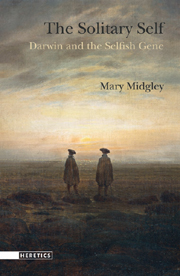Book contents
2 - The background: egoism from Hobbes to R. D. Laing
Summary
Selves standing up for themselves
Since this is common knowledge, we may well ask why the sweeping claim to the dominance of selfishness was ever made. More broadly, why do so many people today (not only Dawkins) feel that they ought somehow to reduce all human motivation to self-interest? Why do they think it is realistic to give an account that conflicts with so much of the evidence?
This reductive project is, as I have suggested, part of the individualistic tradition that has been so important to us politically since Thomas Hobbes (whom we shall later consider) set it off that it sometimes seems to dominate our whole value system. Enlightenment thought in the West has been constantly engaged in separating individuals out from their surroundings: in securing that they have independent status, rather than being seen as merely parts of their families or nations. Independence and Originality, which are aspects of Freedom, are among the qualities that we most honour today. Indeed, freedom of one sort or another has gradually become a central ideal.
There are, however, many different things that we want to be free from. Campaigns in defence of freedom often start by attacking obviously indefensible forms of abuse and oppression. But, as the trouble-some bonds are successively loosened, that process gradually leads us towards the idea that, ideally, each of us ought to stand altogether alone. At a political level, this notion dictates simple slogans such as “one man one vote” (or even, as awkward reformers eventually pointed out, “one person one vote”).
- Type
- Chapter
- Information
- The Solitary SelfDarwin and the Selfish Gene, pp. 35 - 54Publisher: Acumen PublishingPrint publication year: 2010



